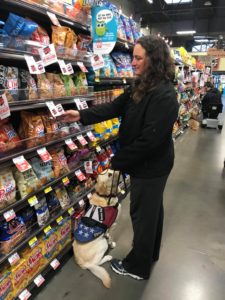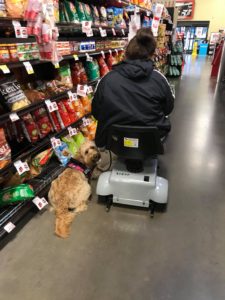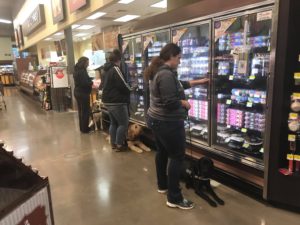Disabling Service Dogs From Doing Their Jobs-
‘Yes, You Can Help Yourself”
By: Meg Bacanskas
 At Top Dog, there is a deep passion for training dogs and helping owners with behaviors ranging from regular obedience to aggression. However, there is also a second heartbeat that drives Top Dog Professional Training, and that is the love for training service dogs.
At Top Dog, there is a deep passion for training dogs and helping owners with behaviors ranging from regular obedience to aggression. However, there is also a second heartbeat that drives Top Dog Professional Training, and that is the love for training service dogs.
This past week Adam has been able to share some of the happenings taking place at the Diabetic Alert Dog Summit (an event where he trains other professionals in the field of dog training, how to train Diabetic Alert Dogs) . This is a great time to remind the public of how they can help, or hinder, the job that a service dog is doing for their owner.
A great deal of training work is done with service dogs in public places (up to thousands of hours). Owners of these service dogs depend on their companions to perform serious and important jobs that directly impact their health. It is critical that members of society do their part in respecting the job of service dogs.
Recently, while Adam was working with a service dog at a grocery store, a woman approached him and the dog. She stated, “I know I shouldn’t, but I just can’t help myself,” and began to reach for and pet the service dog. Adam, knowing how important the work of a service dog is, stopped the woman.

Now, this woman probably left the situation upset and irritated that she could not pet the service dog. While the intent was not to upset the woman, the fact of the matter is that Adam did what was right in this situation, as should any service dog team.
This is a common scene that owners and trainers of service dogs face regularly. It is important to teach adults, as well as children, the proper etiquette with service dogs. There is not a situation in this world, where if you are doing something you know you are not suppose to do, it is okay to use the excuse, “I just can’t help myself.”
If you were to take a candy bar or another item without paying for it, would it be okay to say, “ I know I shouldn’t, but I just can’t help myself”? Would it be ok to walk up and grab a stranger inappropriately, and justify it by saying “ I just can’t help myself”? The answer is a strong no!
The same logic applies with approaching service dogs, and attempting to pet them. Some people may think it is a harmless event, and there is no big deal in petting the service dog they see out in public. This could not be farther from the truth.
Service dogs are used to help owners suffering from a range of disabilities. They are trained to aid and help their owners for specific reasons. Let’s talk about a few reasons why this is such a poor and dangerous decision. For the next example, we will use a Diabetic Alert dog as our subject.
A diabetic alert dog is trained to sniff out when their owner has dangerously high or low glucose events. This is an extremely hard job for the dog, as it takes a lot of concentration to constantly smell and monitor their owners blood glucose levels. Now, if a person comes up and starts petting this service dog the dog is now distracted and not fully performing their job. This could lead to them missing a glucose event, which could result in serious harm to the owner.
 Next, let’s talk about the selfishness that can drive the desire to approach or pet a service dog. You stopping to pet the dog will not in any way have a positive effect on the dog’s day. The appeal for a person to approach and pet a service dog is strictly driven by the selfish desire to love on, and pet the dog, and feel all those great endorphins that are released by the interaction. The one benefiting from this interaction is you, or the person doing the petting. You are distracting the service dog from their very serious job, in order for you to feel good.
Next, let’s talk about the selfishness that can drive the desire to approach or pet a service dog. You stopping to pet the dog will not in any way have a positive effect on the dog’s day. The appeal for a person to approach and pet a service dog is strictly driven by the selfish desire to love on, and pet the dog, and feel all those great endorphins that are released by the interaction. The one benefiting from this interaction is you, or the person doing the petting. You are distracting the service dog from their very serious job, in order for you to feel good.
We also need to consider the owners of these service dogs. By approaching or bringing attention to the service dog, you are now bringing attention to the owner’s disability. This in turn may make the owner feel uncomfortable, and bring unwanted attention their way.
A service dog is legally defined by the Department of Justice as a ‘medical device.’ This means the owners of these dogs have some kind of disability requiring them to have a service dog (the disability may not always be visible). They are legally put into the same category as a wheelchair, oxygen tank, or other medical devices.
Most service dog owners wish they did not have to bring their dogs with them everywhere, but their dog is a medical device that they need daily. A person would not go up to someone in a wheel chair and say things like; “Oh, I wish I could take an oxygen tank with me everywhere I go”, “ Hey, that is an awesome wheelchair, can I pet it?” It is important to consider this when bringing attention to a service dog and their owner. Many of them would love to be able to simply walk in and out of a grocery store without being interrupted multiple times.
The responsibility in keeping service dogs from these frequent interactions while out in public lies on both public citizens, as well as the service dog owners and training teams. If a service dog is allowed to routinely be interrupted from their job to receive attention from strangers this will reinforce a negative behavior and affect the quality of the job a service dog is doing. When it becomes a habit the service dog will begin thinking that when they walk into the grocery store, or any pubic place, it is ok to not pay attention to their owner and seek out free rewards (attention/petting). This can lead to the dog pulling more on their leash, and/or not listening to the owner’s commands.
Service dogs go through an intense and strict training to do the jobs they do. If they begin to develop these bad habits, they are no longer performing their jobs at the best level possible, which puts their owners at risk.
As a public citizen you CAN help yourself and refrain from interacting with service dogs in public. Not only can you bring unwanted attention to the owner’s disability, you could greatly impact the owner’s health by distracting the dog from their job. We need to spread this information to others, including kids, so that we can support the roles service dogs play in our community. It is a serious job the dogs perform for their owners.
So, the next time you see a service dog out, please control the desire to approach the dog and their owner. Take a moment to control that impulse, and respect the owner and the dog.

A wonderful article, Meg. I would like to use this on our website. Would you grant permission?
Jean
May I use your article on my facebook page? Meg you have worded this so well…I would like permission to share it. May I please share it with your credits acknowledged?
Cialis Vendita Generico Acquisto Kamagra